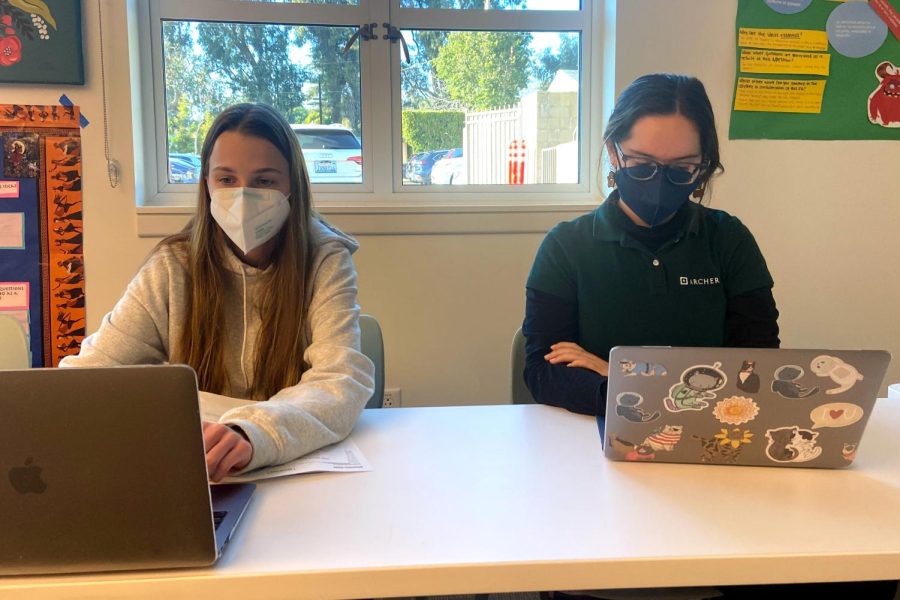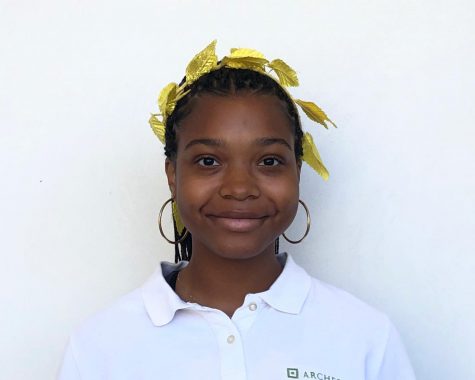PAWS tutoring program is more than a ‘homework club’
Photo credit: Cadence Callahan
PAWS mentors Lily Propkop (’23) and Sofia Woodard (’23) work on assignments during their tutoring session on Jan. 25. PAWS is a tutoring program for all Archer students. The sessions are held Monday through Thursday from 3:15-5:15 in room 151.
February 8, 2022
Archer’s Peer Academic Wellness and Support program, PAWS has been active for nearly nine years and focuses on one-on-one student connections involving academic support and guidance. PAWS is a tutoring program for all Archer students who require academic assistance. This year, the program has expanded to help with wellness, which involves PAWS mentors helping students with crafting emails and organizational skills.
Archer’s Director of Academic Access and PAWS program director Catie Chase has run the program for nine years. Chase said when she was given the project, she wanted to expand upon the idea of the program being just a “homework club.”
“In true Archer fashion, we don’t settle for mediocre programs. I wanted it to be meaningful because life and schoolwork aren’t just about homework or the ‘doing of homework,’” Chase said. “Peer mentoring is really about connection, and what we know from research, and what we know from how we learn best is when we feel connected and supported, we build our confidence and we’re able to tap into our gifts so much more.”
PAWS tutoring sessions are held from 3:15-5 p.m., Monday through Thursday in room 151. During these sessions, students are encouraged to ask for assistance when needed, and students are free to work independently if they choose. Junior PAWS leader Piper Rutman said the tutoring sessions are casual and flexible.
“We help with projects and homework, and it’s like a study hall so anyone can come in for a quiet space and do homework — it’s really nice,” Rutman said.
Rutman has been involved with PAWS since her sophomore year, both as a leader and mentor. Her role entails taking attendance of the mentors at the start of sessions, keeping track of what students need help with and assisting mentees.
PAWS leaders are conventionally junior and senior students, although Chase has made exceptions for freshman and sophomore students who show great interest in the program or have been recommended by a teacher.
“As of right now, upper school students have the opportunity to apply and reflect about why they would want to participate as a mentor because it’s really important that a mentor has time dedicated, even when students don’t show up to sessions,” Chase said. “There are times when students don’t show up to PAWS, and that can be disheartening at times. When you’re a mentor, it’s important that you’re available and you’re presently there even if nobody is.”
Chase said her goal for PAWS is for academic support to be accessible to everyone.
“Oftentimes there’s this stigma, ‘Oh I don’t need the help,’ or ‘PAWS is for middle schoolers,’ and that’s not true,” Chase said. “We all come to a time in our educational journey where we need to relearn skills, we need to review content and help rebuild those short-term and long-term goals.”
PAWS leader Erin Mamalakis (’22) has worked with the program since she was a sophomore but attended sessions herself when she was in middle school. Mamalakis is on the board of PAWS, which includes attending class meetings with Chase to promote the program and thinking of new ways to better support the students who attend sessions.
“Last year, Ms. Chase asked me to be on the board because I was very involved with the program, and I said of course because I loved PAWS,” Mamalakis said. “I had a lot of ideas on how to expand the program, and how to help students with some of the things I needed help with when I was in middle school.”
Mamalakis oversees tutoring sessions on Tuesday afternoons, and assists students with a variety of subjects, such as mathematics, sciences and middle school level English courses. Mamalakis said PAWS offers academic assistance during the school day if needed.
“I specialize in chemistry. I’m the only chemistry tutor that we have throughout PAWS, so I’ve had students who needed help with the subject throughout the years,” Mamalakis said. “This year, I have one, and because she just needs lessons in chemistry, she schedules with me during the day, which is something [PAWS] does if someone needs more specialized help.”
Similar to Mamlakis, Rutman specializes in math and when assisting students, she demonstrates specific problem-solving skills.
“A student will come in and explain what they need help on, and one of the mentors will go over and help them work through it,” Rutman said. “When it comes to math, I go through a problem and show them how to do it step-by-step, and then I’ll say ‘How about you try it now, and do it exactly how I did it,’ and we’ll work through the problems together.”
Rutman said PAWS facilitates in creating connections between upper and middle school students, some of whom Rutman wouldn’t have the chance to interact with throughout the school day.
“PAWS is a really great way for middle schoolers and upper schoolers to build a connection because it’s really separated throughout the day, especially because of COVID,” Rutman said. “Middle and upper schoolers have different eating areas, and we don’t see them a lot during passing periods. PAWS is a really good way to help each other out and create a bond with them.”
Sophomore Elle Moccio, who has attended PAWS sessions since sixth grade, said PAWS is a great resource when studying for chemistry finals.
“Erin [Mamalakis] is a great tutor,” Moccio said. “I can just text her ‘Hey, I’m struggling and I really need help,’ and she’s super benevolent, and we’ll set up a time to meet up and she’ll help me go through review packets.”
Moccio said she benefited from attending the program since middle school and appreciates the peaceful work environment.
“PAWS is a great community space. I became friends with a lot of upper school students when I was in middle school, and I felt cool because of that,” Moccio said. “I love that it’s open to anyone and you don’t have to commit to it necessarily. It’s a positive space I can go to work productively.”
With this being Mamalakis’ last year involved with the program, she reminisced on her years attending sessions, and how motivated and encouraged she felt by fellow PAWS mentors and leaders.
“I have dyslexia, so English was never my strong suit. I have memories of PAWS mentors coming in and helping me read through an assignment, helping me understand words I didn’t, and giving me tricks to learn vocabulary for tests,” Mamalakis said. [PAWS] is a safe space and a little community.”










Tiffany Smith-Anoa'i • Feb 10, 2022 at 3:39 pm
PAWS is such an invaluable resource. Love this reporting Cadence.